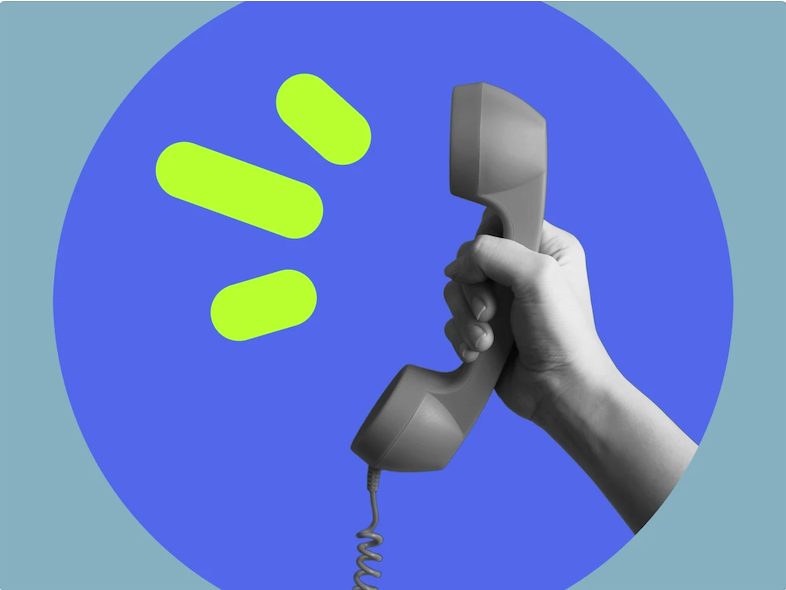Ever wondered what separates a great customer experience from a frustrating one? It often comes down to business call handling. This article explores the essential elements of managing business calls, providing best practices and key skills to improve your customer service approach. Whether you’re a small business owner or managing a large call center, these insights will help you transform every call into a positive experience. Are you ready to upgrade your skills?
What is call handling?
Call handling for business refers to the process of managing incoming and outgoing calls within an organization. This involves answering calls, directing them to the appropriate department or individual, and ensuring the caller’s needs are addressed accurately and professionally. The key is to keep customers happy and maintain smooth business operations.
The key components of telephone call handling include:
- Timely call answering: Ensuring calls are answered promptly to minimize customer frustration and dissatisfaction.
- Identifying caller needs: Asking the right questions to understand the purpose of the call.
- Delivering precise information: Providing clear and accurate answers to queries.
- Engaging communication: Maintaining a polite and friendly tone throughout the call.
- Efficient problem resolution: Addressing and resolving issues swiftly to keep customers happy.
- Managing call transfers: Transferring calls smoothly to the right person without causing delays.
- Recording call details: Keeping thorough records of each call for future reference and improving service quality.
- Follow-up actions: Ensuring any promises made during the telephone call are fulfilled quickly.
Each of these steps is essential for providing excellent service and maintaining a smooth communication flow within a business. Implementing these practices ensures that customer interactions are managed correctly, contributing to overall business success.
How does call handling work?
Handling customer calls begins when an organization receives a call. A receptionist or an automated system first answers the call. This initial contact person or call management system gathers information about the caller’s needs and directs the call to the appropriate department or individual. During this process, call screening may occur to filter out unwanted or irrelevant calls.
Once the call is directed, it may be transferred if the initial recipient is not the correct contact. Call logging is a crucial part of the process, where details of the call, including caller information, purpose, and duration, are documented for future reference. This ensures continuity and context for any follow-up interactions.
Throughout the process, maintaining a professional and courteous demeanor is essential to provide a positive experience for the caller. Call handling ensures that inquiries are resolved accurately, thereby enhancing overall business communication and customer satisfaction.
Inbound vs. outbound call handling
Inbound call handling involves managing calls that come into an organization from customers or clients. These calls often include inquiries, support requests, or service issues. Inbound calls require active listening, problem-solving skills, and a courteous approach. The goal is to accurately and professionally address the caller’s needs, ensuring a positive experience.
Outbound call handling, on the other hand, involves calls made by the organization to customers or potential clients. Outbound calls are typically for sales, follow-ups, or surveys. The process requires clear communication, persuasive skills, and a friendly tone of voice. The objective is to engage the recipient, provide information, and achieve the desired outcome, whether it’s closing a sale or gathering feedback.
Both inbound and outbound call management are crucial for maintaining strong customer relationships and supporting business goals.
Why is call handling important?
Call handling is a critical aspect of customer service that directly influences customer satisfaction, retention, and overall business performance. Key statistics underscore its importance:
- A staggering 89% of consumers have switched to a competitor following a poor service experience, underscoring the importance of effectively managing calls for customer retention.
- Additionally, 78% of customers would switch to a competitor after experiencing multiple poor interactions, emphasizing the need for consistent quality in call handling.
- According to Zendesk, investing in a good customer experience can yield a return on investment of up to 700% over 12 years, as it increases customer retention rates and decreases acquisition costs.
Customer expectations and satisfaction are directly impacted by call handling etiquette:
- According to Oberlo, seventy percent of consumers have made purchasing decisions based solely on the quality of customer service.
- Zendesk states that 67% of customer churn could be prevented if issues are resolved during the first interaction.
- Performance is also a key factor, with 64% of call center agents primarily operating remotely in 2021, highlighting the need for well-managed solutions.
Proper handling ensures that problems are addressed quickly, increasing customer satisfaction and loyalty, ultimately driving better financial performance for businesses.
Components of proper call handling
Ensuring customer satisfaction and maintaining smooth business operations is critical. Here are the key components involved, each essential for managing calls in a professional manner.
| Component | Description |
|---|---|
| Call Answering | Answering calls quickly to reduce wait times and improve customer satisfaction. |
| Call Routing | Directing calls to the appropriate department or individual based on the caller’s needs. |
| Call Screening | Filtering out irrelevant or unsolicited calls to ensure that only pertinent calls are forwarded. |
| Call Logging | Documenting call details, including caller information, purpose, and duration, for future reference. |
| Call Transferring | Connecting the caller to the appropriate party if the initial recipient is not the correct contact. |
| Voicemail Management | Managing voicemails to ensure no important messages are missed and responses are timely. |
| Customer Follow-up | Ensuring all inquiries are resolved by following up with customers after the initial call. |
| Performance Monitoring | Reviewing phone handling processes regularly to identify areas for improvement and ensure the delivery of quality service. |
Implementing these components can lead to better customer service, increased operational speed and success, and a more professional business image. Each component plays a vital role in ensuring that customer interactions are managed smoothly and professionally, contributing to the overall success of the organization.
Benefits of call handling
Reduced call abandonment
Proper call handling decreases the likelihood of customers hanging up due to long wait times. This ensures that more calls are answered and customer issues are addressed, minimizing frustration and potential business loss.
Organized workflow for agents
Well-managed call systems help distribute calls evenly among agents, preventing overload and reducing stress for all parties involved. This results in a more balanced workload and increased job satisfaction among call center staff.
Higher first-call resolution
Routing calls correctly from the start helps resolve customer issues on the first call. This reduces the need for follow-up calls and enhances the overall calling experience for both operators and customers.
Improved customer data
Accurate call logging and data collection provide insights into customer behavior and preferences. This information can be used to improve products, services, and overall business strategies.
Scalability and flexibility
Effective call handling systems can scale with a business’s growth, handling increasing call volumes without compromising quality. This flexibility is crucial for businesses experiencing rapid growth or seasonal fluctuations in call volume.
Compliance and quality assurance
Maintaining thorough records and monitoring call handling processes ensures that businesses comply with industry regulations and standards. Regular performance reviews help maintain high service quality and identify areas for improvement.
Risks of a poorly organized call handling service
Higher call abandonment rates
When calls are not answered in a timely manner, customers may hang up before speaking to an agent. High call abandonment rates indicate issues in handling calls and can lead to lost sales opportunities and diminished customer trust.
This not only affects immediate revenue but also damages long-term customer relationships. Customers who experience long wait times or repeated call drops are likely to seek out competitors who can provide more reliable and responsive service.
Reduced employee morale
Disorganized systems can overload agents with uneven call distribution, leading to increased stress and burnout from call handling. This can result in higher turnover rates, decreased productivity, and a less motivated workforce.

“Bad call handling has also brought about internal strain on work and low staff productivity. Erroneous calls to electricians at workplaces disrupt their work. We estimated that field employees were losing as much as one hour a day in productivity resulting in more than two hundred hours a month among ten electricians. The absence of a clear system introduces unhealthy bottlenecks internally, which kills the morale and affects service quality, which may lead to delays of the projects at a considerable cost. This internal mess has got a negative impact on the whole organization.”
– Adam Bushell, Director/Electrician, AB Electrical & Communications
Chaotic operations
Without proper call routing, logging, and analytics, businesses may struggle to identify and address recurring issues, resulting in failures within the customer service department. This can increase operational costs and reduce the overall efforts of the customer service team.

“In the early days of Hello Electrical it was a madhouse when it came to answering the phone. We always had experienced calls of new customers that did not convert, particularly when it came to urgent services. There was a loss of reputation beyond loss of immediate revenue. When a customer is misleading in his/her call or has to wait ten minutes, he/she gets a bad impression. This results in the negative word of mouth. A single bad review on the Internet talking about bad phone service may scare away tens of potential customers. It leaves a feeling of inorganization and untrustworthiness that is almost impossible to override, which essentially destroys trust.”
– Jason Rowe, Director & Founder, Hello Electrical
Compliance issues
Failure to maintain accurate records and adhere to industry regulations can result in compliance violations. This can lead to legal repercussions, fines, and damage to the business’s credibility.
Missed business opportunities
Poor call management can result in missed opportunities to upsell or cross-sell products and services. Poor customer interactions can also deter potential clients, negatively impacting business growth and revenue.

“Inefficiently executed call handling service can hurt a company indeed. The risks are immense, whether it is missed calls or too long on hold by the customers. I have personally observed instances where customers were angry since they could not have their problems resolved promptly. This is a poor image on the company. Opportunities are likely to be lost unless there is a smooth process.”
– Dorian Menard, Founder and Business Manager, Search Scope
Who should be responsible for the call handling process?
Organizing and monitoring the entire process is crucial for ensuring operations run smoothly and result in high customer satisfaction. Here are the key roles involved and their contributions:
Call Center Manager
Role: Oversees the entire call center operation, ensuring that all systems and processes function effectively.
Contribution: Sets performance metrics, analyzes reports, and implements strategies to improve call handling.
Motivation: Can be motivated through performance-based incentives, professional development opportunities, and recognition for achieving targets.
Team Leaders/Supervisors
Role: Directly manage a team of agents, providing guidance and support.
Contribution: Monitor real-time performance, offer coaching, and handle escalations to improve service quality.
Motivation: Encouraged through leadership training, bonuses for team performance, and career advancement opportunities.
Quality Assurance (QA) Analysts
Role: Evaluate call recordings and interactions to ensure adherence to company standards and identify areas for improvement.
Contribution: Provide feedback to agents, identify training needs, and suggest process improvements based on analysis.
Motivation: Motivated by recognition programs, opportunities to lead quality improvement initiatives, and detailed feedback on their impact.
IT Support Staff
Role: Maintain and troubleshoot call handling software and hardware.
Contribution: Ensure that all technical aspects run smoothly, minimizing downtime and improving agent performance.
Motivation: Motivated by skill enhancement opportunities, involvement in technology upgrades, and competitive compensation.
Agents
Role: Frontline staff who handle customer interactions.
Contribution: Deliver customer service, resolve issues, and gather feedback.
Motivation: Motivated through recognition, performance bonuses, and clear pathways for career growth.
Call handling best practices
Call handling procedures are essential for maintaining customer satisfaction and ensuring smooth operations. Here are some best practices divided into two sections: what to do and what not to do.
What to do
- Answer quickly: Aim to answer calls within the first few rings. Long wait times can frustrate customers and increase call abandonment rates.
- Listen actively: Ensure that your agents listen attentively to the caller’s needs without interrupting. Active listening involves understanding the caller’s issue fully before responding, which helps in providing accurate solutions.
- Use positive language: Encourage agents to use positive and polite language. Positive interactions can enhance the caller’s experience and leave them with a good impression of your business. Phrases like “I can help with that” or “Let’s resolve this issue together” can be very effective.
- Provide clear information: Ensure that agents provide clear and concise information. Avoid jargon or overly technical language that might confuse the caller. Clear communication helps in resolving issues.
- Document calls: Maintain detailed records of each call, including caller information, the nature of the call, and any actions taken. This documentation is crucial for follow-ups and can help in training new agents.
- Follow up: After resolving an issue, follow up with the customer to ensure their problem is fully addressed and they are satisfied with the solution. Follow-ups can also provide useful feedback for improving service quality.
- Train regularly: Regular training sessions for agents on updated protocols, new products, and customer service techniques are essential. Continuous learning helps agents stay informed and skilled in handling various customer scenarios.
What not to do
- Avoid long holds: Do not leave callers on hold for extended periods. If a hold is necessary, inform the caller about the reason and the expected wait time. Periodically check in with them to assure they have not been forgotten.
- Transfer less: Avoid transferring calls multiple times. Ensure that the first point of contact can resolve the issue or transfer the call to the correct department initially. Excessive transfers can frustrate callers and make them feel undervalued.
- Give the caller time: While speed is important, rushing through a call can lead to misunderstandings and unresolved issues. Allow the caller to fully explain their problem and ensure they are satisfied with the resolution before ending the call.
- Avoid negative language: Refrain from using negative or dismissive language. The importance of call handling is in making customers feel heard. Phrases like “I don’t know” or “That’s not possible” should be replaced with more constructive alternatives, such as “Let me find out for you” or “Here’s what we can do.”
Must-have call handling skills
In a small to medium-sized business (SMB) with a call center, certain skills are essential for delivering excellent customer service and resolving problems efficiently. Here are some must-have call handling skills for SMBs:
- Active listening & clear communication:
Fully concentrate, understand, respond, and remember what the caller is saying. Convey information in a straightforward and concise manner, avoiding jargon; do not simply stick to the call handling script. This skill helps with an accurate identification of the customer’s needs, which is crucial for SMBs, as every customer interaction can significantly impact the business. - Patience:
Stay calm and composed, especially when dealing with frustrated or upset customers. Patience is vital for SMBs, as it helps manage difficult situations without escalating the problem and maintaining the company’s reputation. - Empathy
Understand and share the customer’s feelings while the call is handled. Showing empathy can build a connection with the customer, making them feel valued and understood, which is essential for customer retention in SMBs. - Time management
Balance the need to manage calls quickly while ensuring each customer’s issue is thoroughly addressed. Good time management helps in maintaining productivity and reducing wait times for customers, which is important for SMBs with limited resources.
Developing these skills can significantly improve the quality of customer service and enhance overall call center performance.
Best call handling software
MightyCall
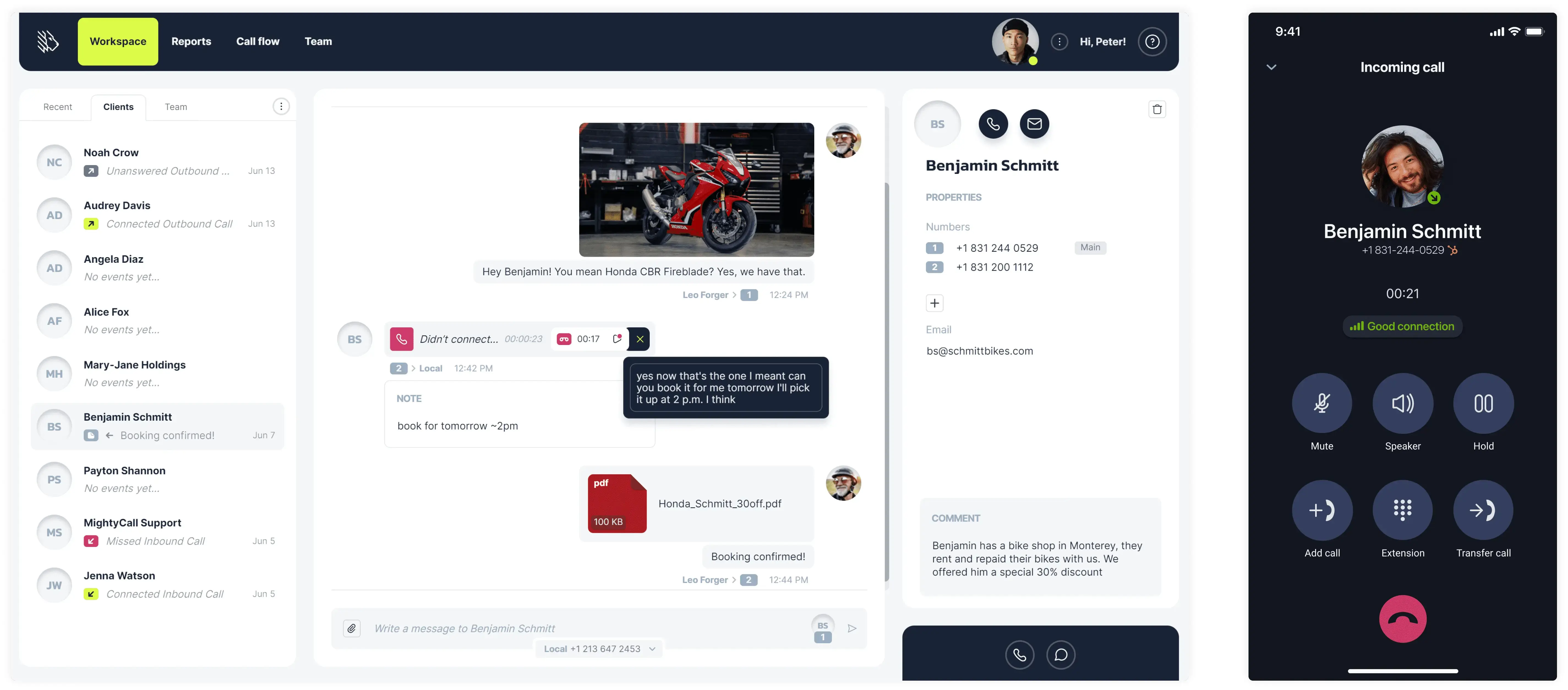
MightyCall is a user-friendly call center system designed specifically for small to medium-sized businesses. It offers a range of features designed to improve in-house call handling and customer service.
Why we picked it
MightyCall was chosen for its effective call handling features that are easy to set up and use. Its interface is intuitive, and it provides all the essential tools for managing business communications, including call routing, recording, and analytics.
Best for
Small to medium-sized businesses seeking an affordable and feature-rich call handling solution.
Pricing
- Core: $25/month per user
- Pro: $45/month per user
- Power: $65/month per user
- Enterprise: Custom pricing
Features
- Auto dialer
- Call monitoring
- Call analytics
- Call routing
- Call recording
- Visual call flow configuration
- Voicemail-to-email
- Custom greetings
Pros & Cons
| Pros | Cons |
|---|---|
| Easy to use | Basic reporting tools |
| Affordable pricing | Limited CRM features |
| Extensive call handling functions and features | |
| Great customer support |
User reviews
MightyCall has received positive reviews for its user-friendly interface, which simplifies call handling and provides an excellent customer experience. Users appreciate this call center solution’s affordability and the range of features offered at competitive prices. It has a rating of 4.5/5 on G2.
schedule your personalized demo with our amazing team

RingCentral
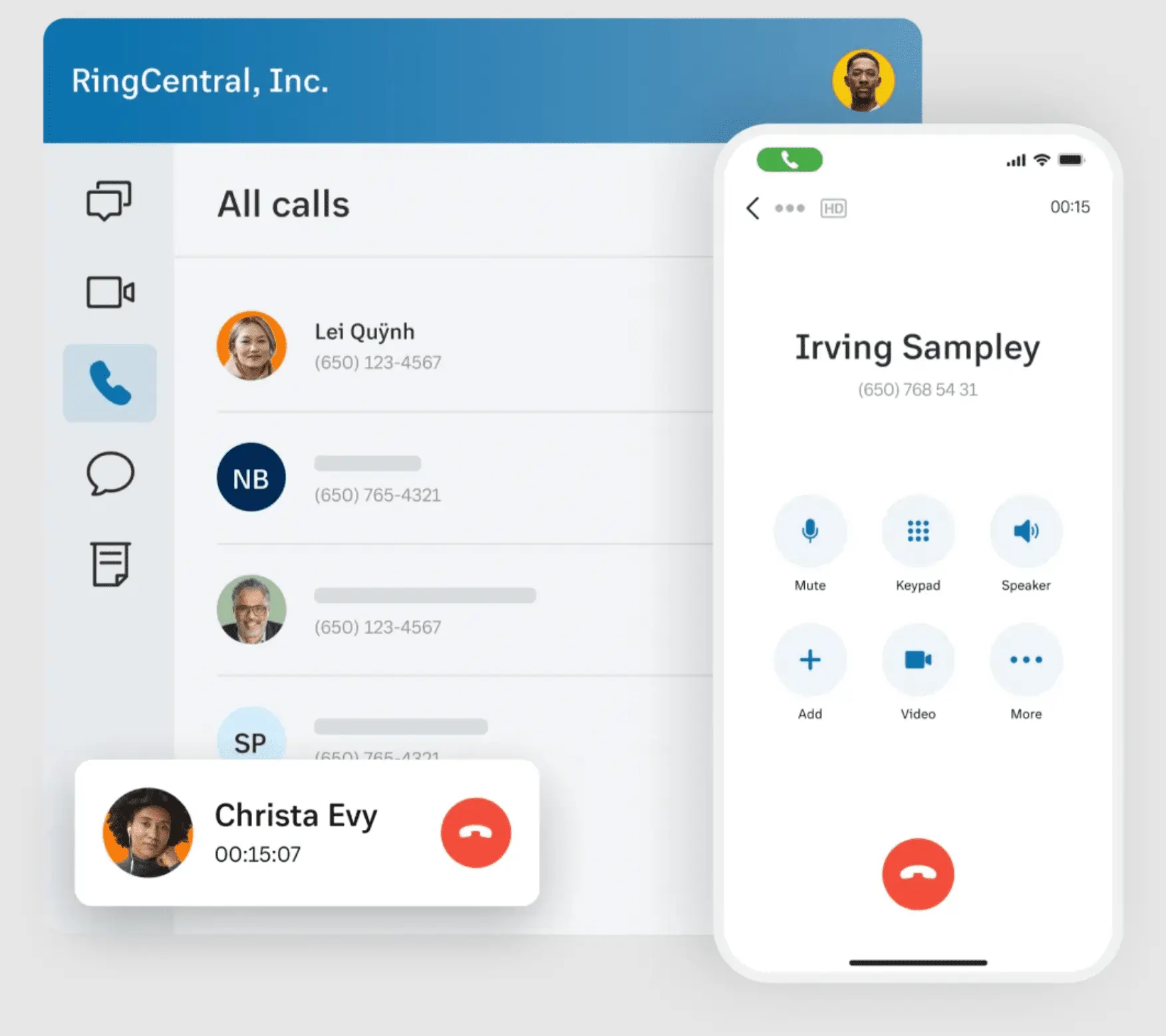
RingCentral is a well-established name in the call center software industry, offering a comprehensive range of features to cater to the diverse needs of businesses, from small to large.
Why we picked it
We picked RingCentral for its extensive experience and broad range of features, including unique options such as internet fax and digital whiteboards. Its ability to handle phone calls and integrate with various CRM systems also makes it a versatile choice for businesses.
Best for
Medium to large businesses seeking a full-featured communications platform.
Pricing
- Core: $30/month per user
- Advanced: $35/month per user
- Ultra: $45/month per user
Features
- Auto call recording
- Digital whiteboards
- IVR (Interactive Voice Response)
- Internet fax
- Integrations with Salesforce, Zendesk, and Google
Pros & Cons
| Pros | Cons |
|---|---|
| Decades of experience | Higher pricing compared to others |
| Diverse feature set | Some features are restricted to higher plans |
| Strong integration capabilities | Complexity in setup for some users |
User reviews
RingCentral is praised for its comprehensive feature set and reliability; however, some users note that the customer experience could be improved. It has a rating of 4.1/5 on G2.
While Ring EX offers excellent features, one downside is that some of the more advanced functions require a subscription. It would be great if basic features like extended video history or smart alerts were included without an added cost.
Phone.com
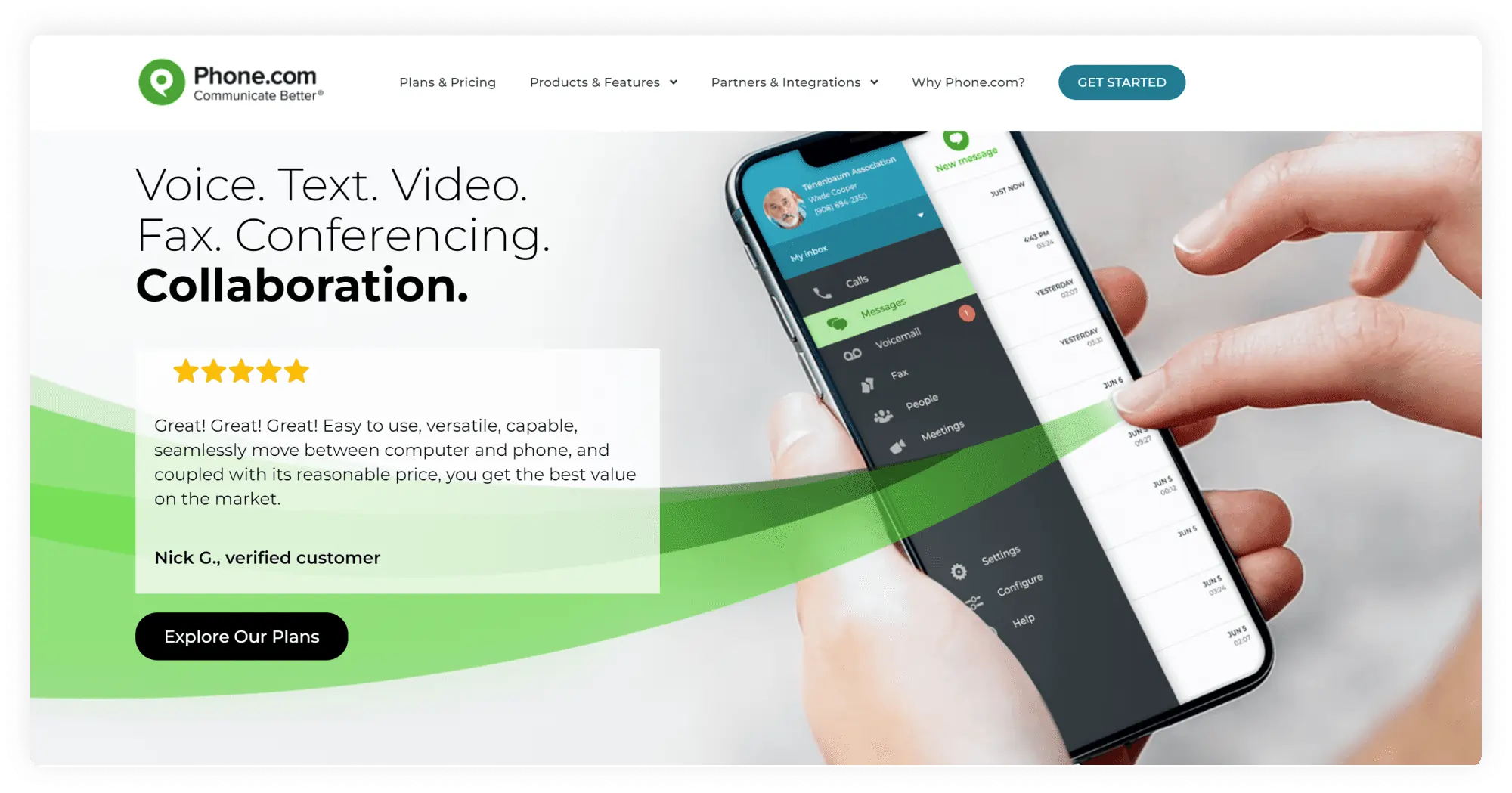
Phone.com is a VoIP phone system that offers call handling service, call forwarding options, phone numbers, and the capacity to place calls using internet-connected devices.
Why we picked it
Phone.com was selected for its affordability and solid basic plan that covers most of the essential needs of smaller teams. It is particularly well-regarded for its ease of use.
Best for
Growing teams, small businesses, and solopreneurs
Pricing
- Basic: $18/month per user
- Plus: $27/month per user
- Pro: $40/month per user
Features
- Business phone numbers
- Auto attendant
- Voicemail and transcription (Not included in Basic)
- Call routing
- Audio calls
Pros & Cons
| Pros | Cons |
|---|---|
| Affordable plans | Additional business numbers at an extra cost |
| Easy to use | The basic plan has limited features |
| Good customer experience | Some users report call quality issues |
User reviews
Phone.com is appreciated for its user-friendly interface and affordability, though some users have mentioned concerns about call quality. It has a rating of 3.5/5 on G2.
Pricing is bit too high for a VoIP service that could potentially be replaced by a very cheap local service on a small company.
Dialpad
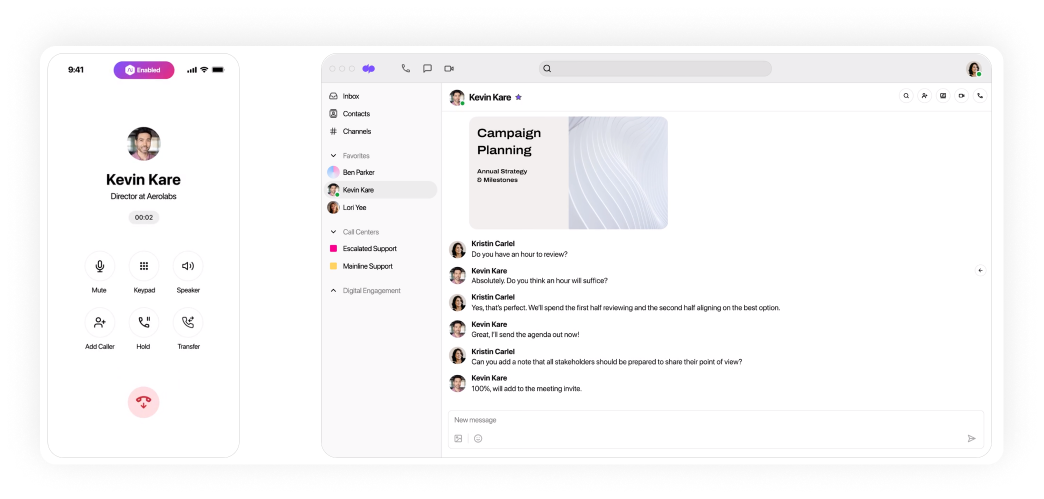
Dialpad is a cloud-based business communications platform that combines voice, video, messaging, and AI into a single, easy-to-use interface.
Why we picked it
Dialpad stands out for its AI-powered communication tools and sleek, modern interface, which is particularly appealing to hybrid and remote teams. If your team values productivity tools, Dialpad is a smart pick.
Best for
Startups and mid-sized businesses
Pricing
- Standard: $27/user/month
- Pro: $35/user/month
- Enterprise: Custom pricing
Features
- AI-powered call transcription and voicemail
- Smart call routing
- Real-time analytics
- Multi-level auto attendants and ring groups
Pros & Cons
| Pros | Cons |
|---|---|
| Strong AI capabilities that boost productivity | Call quality may vary depending on internet stability |
| Clean, user-friendly interface | Limited functionality in the Standard plan compared to competitors |
| Real-time transcription and coaching features |
User reviews
Many users praise Dialpad for its intuitive interface and call handling features. The AI voicemail and transcription tools are especially appreciated for saving time and improving responsiveness. However, some users note that customer support can be slow, and a few have experienced minor issues with the mobile app. It has a rating of 4.4/5 on G2.
Very easy-to-use interface and allows for as much or as little configuration as you could need.
Aircall
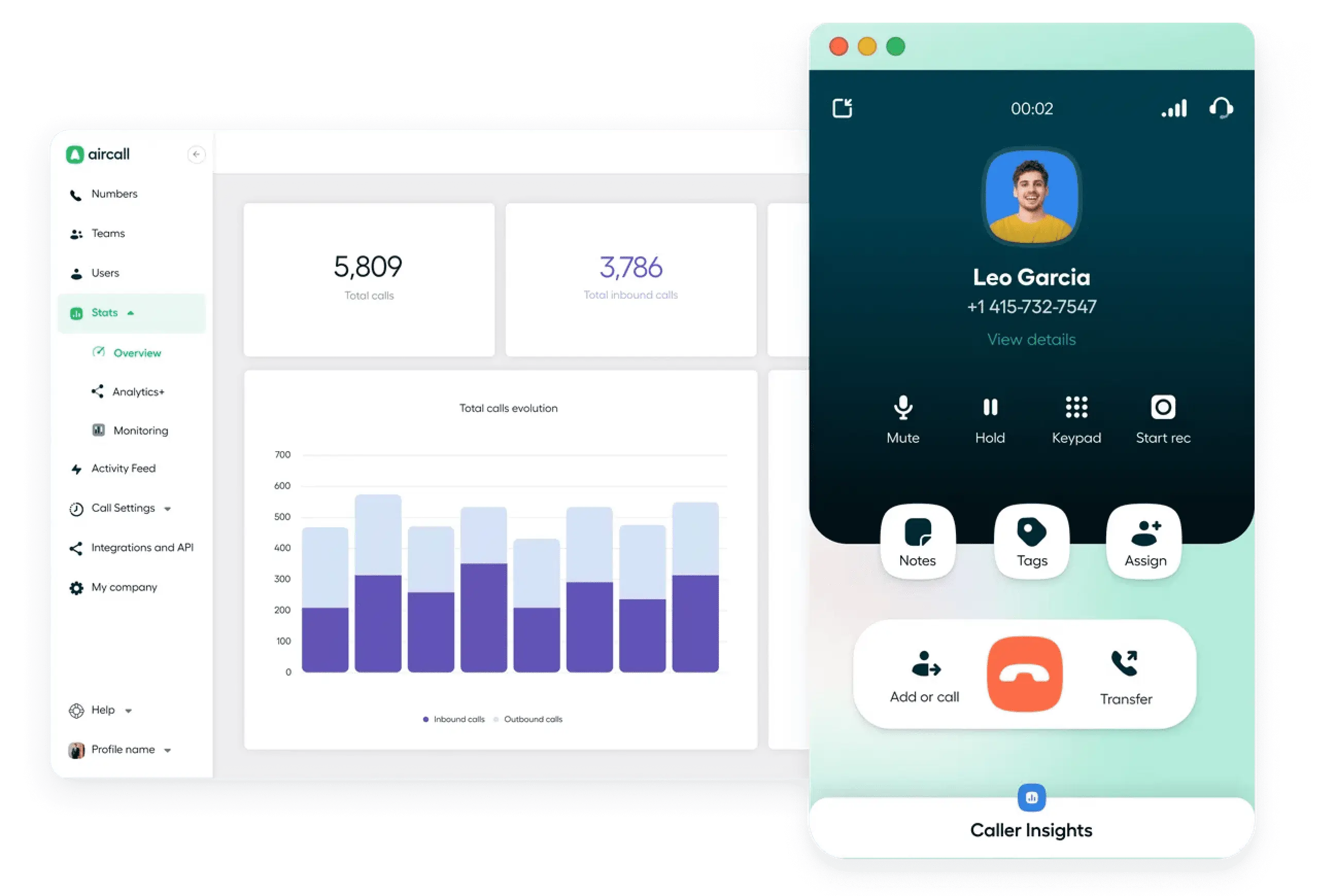
Aircall is a cloud-based phone system built for modern support and sales teams, offering seamless CRM integrations and powerful collaboration features right out of the box.
Why we picked it
Aircall made the list for its simplicity, fast onboarding, and strong focus on customer support and sales teams.
Best for
Customer support and sales teams that rely heavily on CRMs
Pricing
- Essentials: $40/user/month
- Professional: $70/user/month
- Custom enterprise: Call for details.
Features
- Call routing
- IVR menus
- Click-to-dial
- Shared call inbox
- Call tagging
- Live call monitoring
- Call analytics
Pros & Cons
| Pros | Cons |
|---|---|
| Excellent CRM and helpdesk integrations | On the pricier side, especially for small teams |
| Easy to set up and scale across teams | No built-in video calling or AI features |
| Strong call collaboration tools like shared inbox and tagging | Some users report occasional bugs in analytics and reporting |
User reviews
Aircall is frequently praised for its ability to get teams up and running quickly. Users love its intuitive interface. However, some reviewers feel that the pricing could be more competitive, and a few have noted limitations in the depth of reporting or call quality during peak times. It has a rating of 4.4/5 on G2.
It may happen that call quality varies depending on the internet connection, which can be inconvenient during important conversations.
Improve business calls with call handling
Good call management is essential for improving customer satisfaction, helping with operations, and maintaining a professional business image. By selecting the right software, businesses can ensure smooth communication and quick resolution of customer issues. Investing in these tools and developing essential skills can make a significant difference in customer retention and overall business success.



